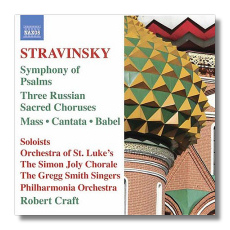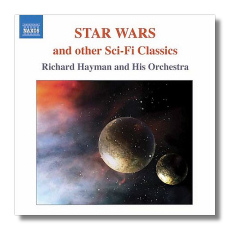
The Internet's Premier Classical Music Source
Related Links
-
Shostakovich Reviews
Stravinsky Reviews
Williams Reviews - Latest Reviews
- More Reviews
-
By Composer
-
Collections
DVD & Blu-ray
Books
Concert Reviews
Articles/Interviews
Software
Audio
Search Amazon
Recommended Links
Site News
 CD Review
CD Review
Naxos Potpourri

Dmitri Shostakovich
The Golden Age (Age of Gold), Op. 22
Royal Scottish National Orchestra/José Serebrier
Naxos 8.570217-18 2CDs


Igor Stravinsky
- Symphony of Psalms 1
- Three Russian Sacred Choruses 2
- Mass 3
- Cantata 4
- Babel 5
4 Mary Ann Hart, mezzo-soprano
4 Thomas Bogdan, tenor
5 David Wilson-Johnson, narrator
2, 3,4 The Gregg Smith Singers
1,5 Simon Joly Chorale
1,5 Philharmonia Orchestra/Robert Craft
3 Orchestra of St. Luke's/Robert Craft
Naxos 8.557504


Star Wars and other Sci-Fi Classics
- John Williams:
- Stars Wars (Excerpts)
- Close Encounters of the Third Kind (Main Theme)
- Larry Rosenthal: Meteor (Main Theme)
- Jerry Goldsmith: Alien (Main Theme)
- Richard Strauss: 2001: A Space Odyssey (Also sprach Zarathustra, Op. 30 Introduction arr. Richard Hayman)
- Glen A. Larson & Stu Phillips: Battlestar Galactica (Main Theme)
Richard Hayman and His Orchestra
Naxos 8.555020
Two well-filled discs comprise the Shostakovich offering here, the first complete recording of his ballet The Golden Age, composed in 1929-30. A Soviet recording of this work may have been issued around the 1960s, but it would not have contained all repeats, as this effort does. At any rate, this is an absolutely essential issue to the Shostakovich enthusiast, not least because of the insightful reading by Serebrier and spirited playing by the Royal Scottish National Orchestra.
The story of the ballet concerns a Soviet soccer team visiting a western city where, in the course of the action, the corruption of Capitalism is exposed and the integrity of the Soviet people and system divulged. If there is a weakness to this work, it is its lack of emotional range. The music is by turns playful, brash, whimsical, glittery, sardonic, comical, but rarely touching or sentimental or passionate. When contrasts to the generally energetic and brassy character come, they hardly break the mood, only the tempo with music perhaps a bit dreamy but still playful, or dark but drolly drunken.
The scoring favors brass and reeds, with saxophones and piccolos prominent in several numbers. Naturally, the xylophone, as with most of Shostakovich's large scores, plays an essential role in the instrumental fabric, too. Overall, the orchestration is brilliant in its colorful character and sense for atmosphere, and the music is charming, if not ultimately very memorable.
But there are a few memorable numbers: Shostakovich's famous though derivative Tahiti Trot (it's based on Tea for Two) makes an appearance in a transcriptive form, as #27, an En'tracte. (It was not in the original score, but added by the composer at the behest of conductor Alexander Gauk.) #30 is a fairly well-known polka, which Shostakovich used in the Suite he drew from this work. The rest of the score is at the least well crafted and imaginative. At times you think the music is about to break into a passage similar in character to that of the Fourth Symphony (1936), the one symphony of Shostakovich that comes to mind while listening to The Golden Age. But when the music veers close to that work, it always seems to avoid becoming that serious.
The most serious music in the ballet comes in the Sixth Scene, Prison Building, wherein the Prelude and ensuing Scene of Freeing the Prisoners do take on a somewhat grim character at times; yet Shostakovich just can't quite take the class-struggle politics of the story seriously enough – thankfully. As suggested above the performances are splendid, and the sound provided by Naxos is excellent. Highly recommended.
The Stravinsky disc is a collection of the composer's sacred choral music, with the most important offering here The Symphony of Psalms. Craft, of course, was Stravinsky's assistant in the latter decades of the composer's career. He interested Stravinsky in the twelve tone system and thus had some influence in the creation of Canticum sacrum and Agon. He also led the premières of some of Stravinsky's later works (In Memoriam Dylan Thomas and Requiem Canticles). He has been engaged in a Stravinsky project in recent years for Naxos, though some of the issues involve releases of earlier recorded material. Babel and Symphony of Psalms are the most recently recorded works here, having been done in 2002 and 2001, respectively. The other works date to the previous decade, though all are vividly recorded.
The Symphony of Psalms here goes up against stiff competition from Boulez, Ančerl, Järvi, Stravinsky himself and many others. But Craft knows Stravinsky's music about as well as anyone today and he turns in an excellent performance, drawing especially fine singing from the Simon Joly Chorale in the crucial finale. The orchestra responds well throughout, too, hardly a surprise, though, since the Philharmonia has long been touted, rightly so, as England's finest. Detail emerges vividly too, and rarely has the work ever sounded so epic, so monumental in its sacral character. The ethereality and sense of peace near the close (Laudate Eum in cymbalis…) are deftly and beautifully rendered. This is one of the finest – maybe even the finest – recording of this masterpiece available. Perhaps only Boulez is a strong rival in this piece.
The other works are consistently well performed and sung, too. Most of them are not well known to the average listener, though all will offer rewards. The sound on all works is clear and Craft's readings are top-drawer. Craft also wrote the booklet notes and, needless to say, they are enlightening. Another winner from Naxos.
The Stars Wars disc here offers six excerpts from the John Williams score: the main title, Princess Leia's theme, The Battle, Cantina Band, The Little People, and The Throne Room. It is decently played, though I could imagine a front-rank symphony orchestra rendering it with a bit more spirit. Still, the playing is colorful and more than adequate, with numbers like the perky Cantina Band coming across with real spunk. Of the other items here, the title music to Alien by Jerry Goldsmith is perhaps the most substantial. It is chilling in its creepiness, unsettling in its profoundly desolate main theme. Hayman seems to try to emphasize the brighter aspects of the scoring here, but Goldsmith's deftly atmospheric writing stubbornly refuses to allow much sunlight in. The Strauss transcription would make the composer roll over in his grave, though some listeners may go for this kind of hokey takeoff. It's well played, no doubt. Other items of note here are the Battlestar Galactica music, which Hayman and his orchestra render with spirit and commitment. The sound throughout is vivid. Recommended to enthusiasts of film scores.
Copyright © 2007, Robert Cummings





















